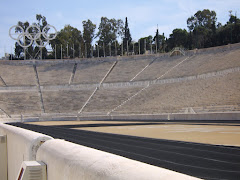 Happy New Year! Thanks to folks who visited or returned to the site since last pre-Christmas post. Recent weeks were an adventure that, for me, included an Amtrak trek to New Orleans (to catch a discounted flight to Oklahoma for a week of holiday vacation and family time) and a return to work with the openings of Cirque du Soleil 'KOOZA' and Stone Mountain Park's new Snow Mountain attractions (disclosure: both are clients of Edelman, my employer of almost 10 years).
Happy New Year! Thanks to folks who visited or returned to the site since last pre-Christmas post. Recent weeks were an adventure that, for me, included an Amtrak trek to New Orleans (to catch a discounted flight to Oklahoma for a week of holiday vacation and family time) and a return to work with the openings of Cirque du Soleil 'KOOZA' and Stone Mountain Park's new Snow Mountain attractions (disclosure: both are clients of Edelman, my employer of almost 10 years).With a full weekend to rest and relax, yesterday I screened an oldie but a goodie that arrived via Netflix, and for those who appreciate early films like "Sunset Boulevard," Hitchcock's "Life Boat" or other classics, I now highly recommend "Charlie Chan At The Olympics" -- a 1937 release -- so you may also get your "Olympic fix" in a new way.
Hawaii-based master detective Charlie Chan takes on a nail-biting, albeit slightly kitschy, case through which a murder is committed when a pre-war U.S. flying device is stolen and taken to the 1936 Berlin Olympics, where Chan's "No. 1 son" will compete in the 100-meter swimming events.
This film packs in about as much coolness as one surprised viewer could absorb.
First, there's multinational intrigue on par with "Patriot Games" or any James Bond 007 drama.
Then there's global travel on a cruise ship (including the liner that transported the U.S. Olympic Team to Germany), trains, and event a clipper plane to catch a Trans-Atlantic flight on the Hindenburg (curious note: this film debuted on screens only two weeks after the real Hindenburg met it's spectacular fate in Lakehurst, N.J. -- I have to wonder the extent to which they pondered delay of the release due to the Zeppelin tragedy; so far, no evidence that they held the screen release due to the explosion, but rather, one site mentions the film was pulled due to Nazi influence ... in spite of the fact not one Nazi appears in the film). Chan's VIP airship flight even makes it to Berlin in time for overhead shots of the Olympic stadium and Olympic opening ceremony rehearsals (well, at least in the film they are portrayed as pre-Games overhead shots).
There's also good humor, archival and Hollywood-made Olympic moments from the 1936 Berlin Olympic Games, and not one mention of Hitler (all of the German officials actually appear in pre-Nazi German military uniforms, and all of the panning shots of the Games somehow are void of Third Reich logos and propaganda signage). Olympic aficionados will love Chan's scenes portrayed inside the Olympic stadium as his son's teammates cheer for Jesse Owens and other U.S. competitors at the Games (some sources cite these scenes were filmed at Memorial Coliseum in Los Angeles, site of the 1932 Los Angeles Olympic Games, but I beg to differ -- though no doubt some scenes must have been filmed in L.A., the Olympic Stadium appears authentically Berlin, save a few close-ups of Chan with other characters).
It was interesting to me that this 20th Century Fox release included a character named "Major Strasser," a German military officer, and this name later appeared in a little Warner Bros. picture you may have heard of titled "Casablanca" (in this latter film, officer Strasser is that guy who was felled by a bullet, yielding the fantastically quotable line, "Major Strasser has been shot -- round up the 'usual suspects'").
I also could hardly believe my eyes that the U.S. Olympic Committee and International Olympic Committee apparently had no problem with the use of the Olympic rings on virtually every scene involving athletes and the Games. The U.S. athletes are clearly clad with the U.S.O.C.'s red, white and blue crest with rings, Olympic flags are flying (much like the 1924 establishing shots in "Chariots of Fire," arguably the best Olympic film ever). Heck, the script for "Charlie Chan at the Olympics" even includes Chan receiving box seats for the Opening Ceremony and other tickets, with compliments of the IOC (or are they?).
Though racy by today's P.C. standards, Chan's truisms are another delight during this film. I laughed out loud several times as he, or his sons, unloaded fortune cookie-like phrases including "Perhaps good idea not to accept gold medal until race is won" and "As my pop would say, 'When a woman play with fire, man get burned."
The know-it-all old-maid landlady of the Honolulu hotel (scene of the murder) steals the show.
The new year will no doubt bring plenty of excuses to blog about the Olympics. I appreciate everyone who's viewed this site since its pre-Beijing Olympic inception. Please keep coming back for Vancouver 2010 Olympic updates, 2016 Olympic Bid movements and all Olympic rings and other things trivia and storytelling.
And take the advice of Chan: "Don't rub sore finger with sandpaper."












No comments:
Post a Comment